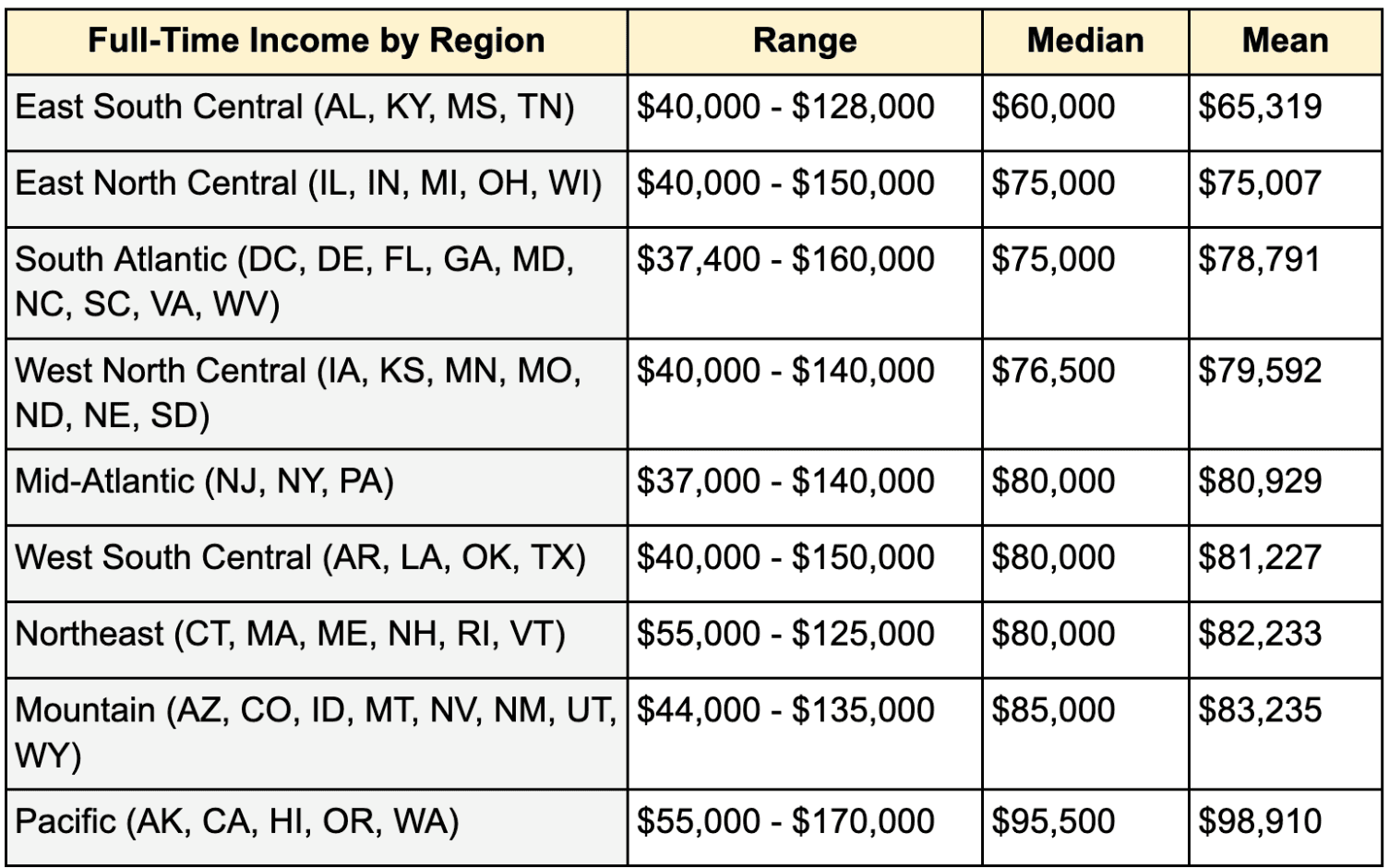Resources for dental hygienists
Knowing your earning potential as a dental hygienist is important, whether you're just starting out or evaluating your current pay. Dental hygienist salaries can vary widely. The latest DentalPost salary data shows hourly rates ranging from $17.00 to $90.00. Annual income ranges from $37,000 to $170,000. We'll explore the factors affecting these earnings, including location, experience, work setting, and compensation structures, to help you make informed career decisions.
Jan 16, 2025
What is the Average Dental Hygienist's Salary?
According to the Bureau of Labor Statistics, dental hygienists earn a median annual wage of $87,530, with the mean (average) annual wage slightly higher at $89,890.
Meanwhile, Dental Post’s 2025 salary survey reports that the median full-time income of registered dental hygienists is $80,000, with the mean at $81,267.
This places dental hygiene among the well-compensated healthcare support professions.
But how does income vary according to region?
Here’s a complete breakdown of dental hygienist salary ranges in different areas of the country:

Source: 2025 Dental Industry Salary Report by DentalPost
Factors Affecting Dental Hygienist Salaries
Dental hygienist salaries can vary depending on various factors, such as where you live and years of experience.
Geographic Location and Cost of Living
Where you practice greatly affects your earning potential as a dental hygienist.
According to the Bureau of Labor Statistics, top-paying states include Washington ($123,510), California ($118,330), Alaska ($115,980), District of Columbia ($113,600), and Oregon ($103,440).
However, these higher salaries often correlate with increased living costs, so factor this into your calculations.
Experience and Education
Your years of experience impact your earning potential. DentalPost reports that entry-level hygienists (under four years of experience) have an average hourly wage of $48.
But those with 14 to 19 years of experience earn considerably more, with an hourly wage of $59.
Advanced education and specialized skills, such as expertise in periodontics or anesthesia certification, lead to higher pay. You can also find higher-paying temp opportunities on dental staffing apps like Teero.
Work Setting and Employment Type
The type of practice you work in affects your salary. While most dental hygienists work in dental offices with an average salary of $90,160, some alternative settings offer higher compensation. Employment services positions average $95,650 annually, while outpatient care centers provide around $90,310, according to recent BLS data.
Pay Structure Models
Dental practices offer various compensation models:
Base hourly plus commission: Provides a guaranteed minimum wage with additional commission for exceeding production goals.
Straight commission: Offers a percentage of total production, which maximizes your earning potential but comes with increased income variability.
Hourly plus bonus: Combines steady base pay with performance bonuses ranging from 10-20% of billed services.
Hourly pay: Provides a fixed hourly rate for all hours worked, offering consistent and predictable income without reliance on performance-based incentives.
Additional Benefits
When evaluating total compensation, consider that only 36% of dental hygienists receive medical benefits, while 24% receive dental benefits. This benefits gap can affect your overall compensation, so consider it while negotiating your salary.
Market Demand and Growth
Demand for dental hygienists in your area can affect salary levels.
Although the profession is experiencing rapid growth, demand still varies regionally. Areas with higher demand typically offer more competitive salaries and additional incentives to attract qualified professionals.
Types of Benefits and Additional Compensation
When you understand how benefits work in dental hygiene, it’ll be easier to weigh career opportunities and earn more.
Traditional Benefits
Benefits vary between full-time and part-time positions. Full-time hygienists typically receive more comprehensive packages that include:
Health coverage
Dental benefits
Retirement planning
Professional Development
Many dental practices support continuing education and professional growth by offering benefits such as tuition reimbursement for continuing education, coverage for professional association memberships, and funding for conferences and seminars.
Work Schedule Flexibility
Work schedule flexibility varies depending on your employment arrangement. Full-time positions typically offer more structured schedules along with better benefits.
On the other hand, part-time opportunities give you more control over the rest of your schedule.
For example, if you sign up with a dental staffing platform like Teero, you can find temporary hygienist positions in your area and pick up shifts as needed.
Other Compensation
Beyond base pay, many practices provide additional compensation, including performance bonuses, production incentives, uniform or scrub allowances, and paid continuing education time.
Career Growth and Earning Potential
As you gain experience and expand your skill set as a dental hygienist, your earning potential increases.
Advanced education and certifications can lead to higher pay and open up opportunities beyond clinical practice, including roles in dental office management, education, and research.
Specializing in certain areas or taking on expanded functions in states that allow it can further boost your earnings.
Boost Your Career and Find Flexible Opportunities with Teero
Dental hygiene offers strong earning potential and flexible opportunities. But finding the right job with the flexibility and pay you want can be challenging.
Teero’s dental staffing platform makes it easy for you to take control of your career. Choose when and where you work, enjoy competitive pay, and access benefits like malpractice insurance and employer-paid taxes.
Download the Teero app today and discover opportunities that match your professional goals.
